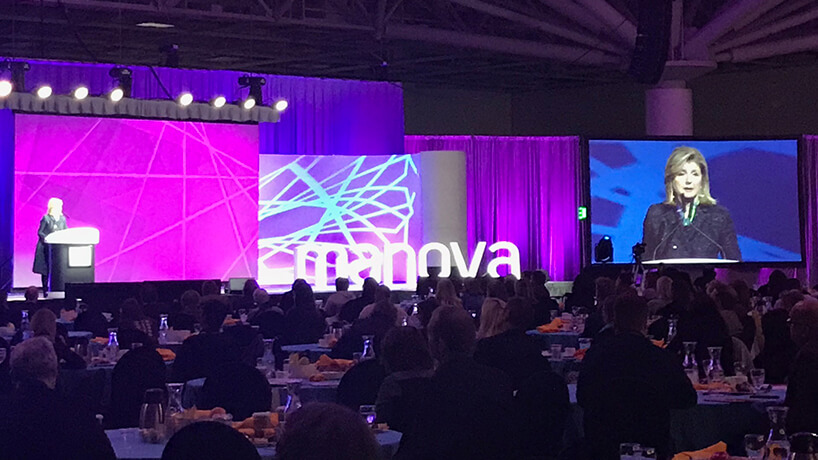When Arianna Huffington took the stage to sound the closing note for the first-ever MANOVA Global Health Summit in Minneapolis on Oct. 11, her message applied to every member of the audience: No matter who you are or what you do, you need to get some rest. Relaxing is easier said than done in today’s constantly connected culture, though. Email messages, Slack groups, Skype calls, and more — there is always another request that needs a response or a task that requires completion.
With all those communication interruptions, how are we supposed to give ourselves room for the seven to nine hours of sleep that doctors recommend? Huffington offered one simple solution that she referred to as a “micro-step.”
“The key is to declare an end to your day,” Huffington told the crowd. “Pick a time to mark the end of your day by turning off your laptops, tablets, and smartphones and taking them out of your bedroom.”
According to Huffington, keeping your smartphone away from your bed is the most important piece of that equation. Most of us are doing a terrible job of that, though. Huffington shared that 72 percent of American adults sleep with their phones on their nightstands or in their beds. If they wake up in the middle of the night, the temptation to hit the home button and explore the world of apps, social-media feeds, and endless distractions awaits. For those who use their smartphones as their morning wake-up calls, Huffington has another simple message: Buy an alarm clock. She bought one for all her friends last holiday season.
Huffington’s strong support of sleep and relaxation is rooted in her own experience of burnout. In 2007, she collapsed from exhaustion, broke her cheekbone, and woke up in a pool of blood. The scary episode helped inspire her to launch Thrive Global, a company that aims to help individuals and organizations break up with what she calls the “always-on culture that never stops.” At MANOVA, Huffington offered two examples of the power of sleep from opposing ends of the burnout spectrum. Elon Musk, known for disrupting the automotive industry and aiming to get to Mars, seems to use sleep deprivation as a driving force, and that force managed to cost him his role as Tesla’s chairman along with a $20 million fine payable to the Securities and Exchange Commission. Jeff Bezos, on the other hand, believes sleep is one of the most important ingredients in Amazon’s recipe for success.
“Making a small number of key decisions well is more important than making a large number of decisions,” Bezos told Thrive Global in an interview on why he strives for eight hours of sleep each night. “If you shortchange your sleep, you might get a couple of extra ‘productive’ hours, but that productivity might be an illusion. When you’re talking about decisions and interactions, quality is usually more important than quantity.”
So while those smartphones next to our beds might feel like productivity tools that make sure we hear the buzz of an email from the boss, Huffington reminded the MANOVA audience that those vibrations can wait until the morning.
“Give yourself full permission to disconnect,” she said, “so you can deeply recharge.”
With that, I think I’m going to go order an alarm clock from Amazon.
Read about how sleep affects attendees at your events in Convene’s CMP series.

